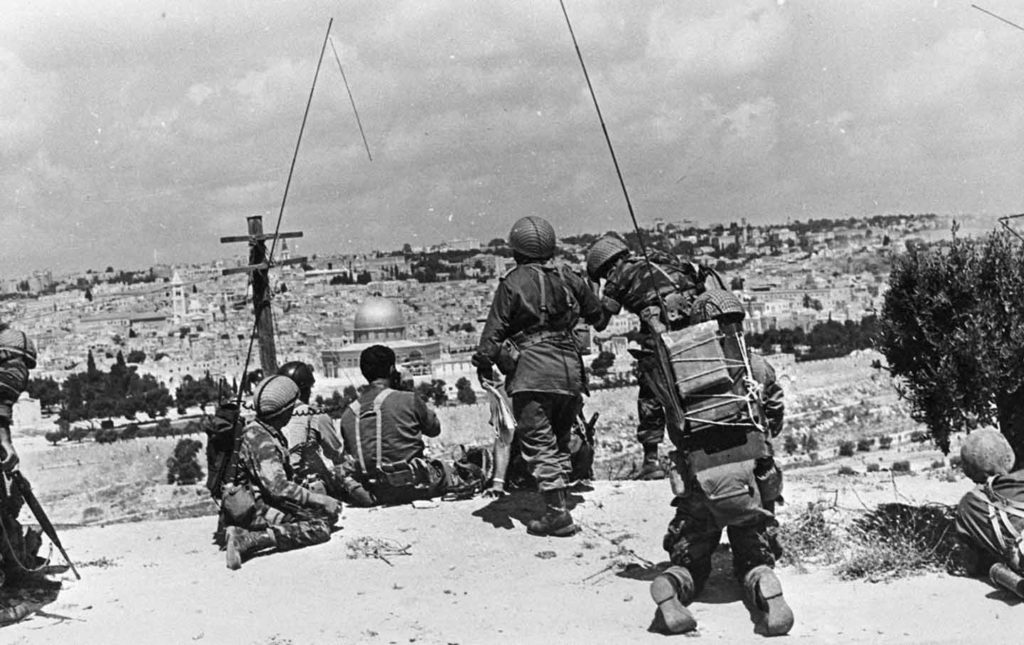Australia/Israel Review
Deconstruction Zone: Why history still matters
Jul 2, 2020 | David Harris

Mention history and it can trigger a roll of the eyes.
Add the Middle East to the equation and folks might start running for the hills.
But without an understanding of what happened in the past, it’s impossible to grasp where we are today.
Fifty-three years ago on June 5, the Six-Day War broke out.
While some wars fade into obscurity, this one remains as relevant today as it was in 1967.
Politicians, diplomats, and journalists continue to grapple with the consequences of that war, but rarely consider, or perhaps are even unaware of, the context.
First, in June 1967, there was no state of Palestine. It didn’t exist and never had. Its creation, proposed by the UN in 1947, was rejected by the Arab world because it also meant the establishment of a Jewish state alongside.
Second, the West Bank and eastern Jerusalem were in Jordanian hands. Violating solemn agreements, Jordan denied Jews access to their holiest places in eastern Jerusalem. To make matters still worse, they desecrated and destroyed many of those sites.
Meanwhile, the Gaza Strip was under Egyptian control, with harsh military rule imposed on local residents.
And the Golan Heights, which were regularly used to shell Israeli communities far below, belonged to Syria.
Third, the Arab world could have created a Palestinian state in the West Bank, eastern Jerusalem, and the Gaza Strip any day of the week. They didn’t. There wasn’t even discussion about it.
Fourth, the 1967 boundary at the time of the war, so much in the news these days, was nothing more than an armistice line dating back to 1949 – familiarly known as the Green Line. That’s after five Arab armies attacked Israel in 1948 with the aim of destroying the embryonic Jewish state. They failed. Armistice lines were drawn, but they weren’t formal borders. They couldn’t be. The Arab world, even in defeat, refused to recognise Israel’s very right to exist.
Fifth, the Palestine Liberation Organisation (PLO), which supported the war effort, was established in 1964, three years before the conflict erupted. That’s important because in 1964 the only “settlements” were Israel itself.
Sixth, in the weeks leading up to the Six-Day War, Egyptian and Syrian leaders repeatedly declared that war was coming and their objective was to wipe Israel off the map. There was no ambiguity in their blood-curdling announcements.
The record is equally clear that Israel, in the days leading up to the war, passed word to Jordan, via the UN and United States, urging Amman to stay out of any pending conflict. Jordan’s King Hussein ignored the Israeli plea and tied his fate to Egypt and Syria. His forces were defeated by Israel, and he lost control of the West Bank and eastern Jerusalem.
Seventh, Egypt’s then-president Gamal Abdel Nasser demanded that UN peacekeeping forces in the area, in place for the previous decade to prevent conflict, be removed. Shamefully, without even the courtesy of consulting Israel, the UN complied. That left no buffer between Arab armies being mobilised and deployed, and Israeli forces in a country one-fiftieth, or two per cent, the size of Egypt.
Eighth, Egypt blocked Israeli shipping lanes in the Red Sea, Israel’s only maritime access to trading routes with Asia and Africa. This step was understandably regarded as an act of war by Jerusalem.
Ninth, France, which had been Israel’s principal arms supplier, announced a ban on the sale of weapons on the eve of the June war. That left Israel in potentially grave danger if a war were to drag on and require the resupply of arms.
And finally, after winning the war of self-defence, Israel hoped that its newly-acquired territories, seized from Egypt, Jordan, and Syria, would be the basis for a land-for-peace accord. Feelers were sent out. The formal response came on Sept. 1, 1967, when the Arab Summit Conference famously declared in Khartoum: “No peace, no recognition, no negotiations” with Israel. More “noes” were to follow.
Today, there are those who wish to rewrite history.
They want the world to believe there was once a Palestinian state.
They want the world to believe there were fixed borders between that state and Israel.
They want the world to believe the 1967 war was a bellicose act by Israel.
They want the world to believe post-1967 Israeli settlement-building is the key obstacle to peacemaking. The Six-Day War is proof positive that the core issue is, and always has been, whether the Palestinians and larger Arab world accept the Jewish people’s right to a state of their own. If so, all other contentious issues, however difficult, have possible solutions.
In other words, when it comes to this conflict, dismissing the past as if it were a minor irritant at best, irrelevant at worst, won’t work.
David Harris is the CEO of the American Jewish Committee (AJC). ©AJC, reprinted by permission, all rights reserved.
Tags: Egypt, Israel, PLO, Palestinians, Syria






